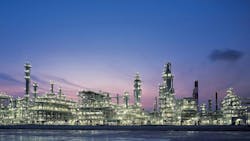Shell concludes sale of Singapore refining, chemicals park
Shell PLC has completed the sale of its interest in subsidiary Shell Singapore Pte. Ltd.’s (SSPL) integrated refining and petrochemical operations in Singapore, including a 237,000-b/sd refinery and 1.161-million tonne/year (tpy) ethylene cracker on Pulau Bukom, as well as certain chemical production units on Jurong Island (OGJ Online, May 8, 2024).
As part of the transaction finalized on Apr. 1, CAPGC Pte. Ltd.—a joint venture of Indonesia-based PT Chandra Asri Pacific Tbk (Chandra Asri) subsidiary Chandra Asri Capital Pte. Ltd. (80%) and Glencore PLC’s Glencore Asian Holdings Pte. Ltd. (20%)—acquired 100% of SSPL subsidiary Aster Chemicals and Energy Pte. Ltd.’s (ACEPL) dual-site Shell energy and chemicals park (SECP) on Bukom Island and Jurong Island, Shell and ACEPL said in separate releases.
Connected by a 5-km subsea pipeline, ACEPL said the former dual-site SECP will now be known as Aster energy and chemicals park (AECP), a fully integrated refining and chemicals manufacturing hub that—consisting of the newly named Aster Bukom chemicals and energy complex and Aster Jurong Island chemical complex—will continue supplying energy and advanced chemical products via pipeline and sea using its existing workforce to meet the growing customer demand on Jurong Island and the wider Singapore ecosystem.
With the finalized acquisition, ACEPL will now formally act as operator of AECP, which—in addition to Bukom operations—spans two sites covering more than 60 hectares on Jurong Island. These include units at Seraya for manufacturing mono-propylene glycol, polyols, propylene oxide, and styrene monomer, with units at Merbau for production of ethylene oxide, ethoxylates, and monoethylene glycol, according to ACEPL’s updated website.
For ACEPL, the acquisition represents a major step in expanding CAPGC’s strategic footprint in the regional energy and chemicals industry to become a leading player in and advance the energy and manufacturing sectors across Southeast Asia, the operator said.
Shell—which in May 2024 characterized the planned sale as part of its broader attempt to achieve net-zero emissions across its global operations by 2050—said on Apr. 1 the Singapore divestment is “in line with [the company’s] ongoing efforts to high-grade its chemicals and products business.”
Previously committed to achieving net-zero emissions by 2050, Shell has since backed off any guarantees of its ability to fully decarbonize its operations by the global target deadline, informing investors that—based on the current economic environment and the operator’s 10-year planning period that does not yet include 2050—if society is not net-zero in 2050, there would be “significant risk that Shell may not meet this [2050] target.”
About the Author
Robert Brelsford
Downstream Editor
Robert Brelsford joined Oil & Gas Journal in October 2013 as downstream technology editor after 8 years as a crude oil price and news reporter on spot crude transactions at the US Gulf Coast, West Coast, Canadian, and Latin American markets. He holds a BA (2000) in English from Rice University and an MS (2003) in education and social policy from Northwestern University.

